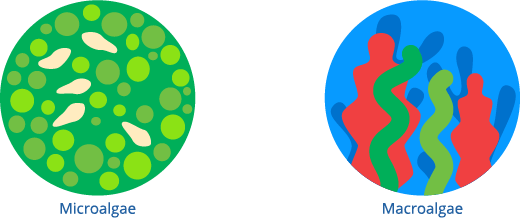Table of Contents
Our planet is at a crossroads. With a rapidly growing global population, the demand for food is soaring, yet our current agricultural practices are straining the Earth's finite resources. The stark reality? Our current approach to food production and consumption is unsustainable.
However, amidst the challenges, there is a beacon of hope: algae. Often dismissed as mere pond scum, this green powerhouse might just be our answer to some of the pressing environmental and nutritional challenges we face today. In the realm of sustainable foods, algae stands out not just as a potential food source, but also as a tool to combat climate change. Let’s dive deeper into why algae might be the unsung hero of our sustainable future.
What Is Algae?
Algae is a diverse group of photosynthetic organisms that harness energy directly from sunlight, similar to plants. However, they stand apart from typical plants due to their lack of roots, stems, and a dependence on soil. Instead, they absorb nutrients directly from the water.
Commonly found in various aquatic environments, algae can manifest as the familiar green layer atop ponds or as vast seaweed forests in the ocean.
There are two different kinds of algae: microalgae and macroalgae.

1. Microalgae
Microalgae are the minuscule powerhouses of aquatic environments. These single-celled organisms might escape the naked eye, but they play a colossal role in aquatic ecosystems. In certain conditions, they can multiply rapidly, forming 'blooms'. A familiar example is the blue-green algae, which can blanket ponds with its vibrant hue.
2. Macroalgae
Often recognized by the popular term 'seaweed', macroalgae are the larger cousins in the algae family. Unlike their microscopic counterparts, macroalgae consist of multiple cells, giving them a more plant-like appearance. They're not just for sushi – their versatile nature means they have potential far beyond the dinner plate.
Despite their differences, both micro- and macro-algae offer promising solutions in our quest for sustainable food sources. Together, they might just revolutionize our global food narrative.
How We’re Using Algae Now
You might raise an eyebrow at the idea of algae on your plate, but there's a good chance you've already had a taste! Algae has been an integral part of our diet for centuries, and its importance is only growing.

Algae's dietary roots run deep. The Aztecs, for instance, made cakes from the blue-green algae, spirulina. Fast forward to today, and communities in Chad still relish it as a daily staple.
Far from being a relic of the past, algae is a rising star in today's food industry. Swing by a health food store, and you'll be surprised at the variety:
- Seaweed Delights: Think sushi rolls and nori wraps.
- Spirulina Smoothies: A nutrient-packed addition to your green blends.
- Plant-Based Omega-3s: Capsules that offer a fish-free omega-3 source.
- Crunchy Algae Chips: A twist on your regular snack!
Algae's magic doesn't end there. Its unique properties make it a valuable thickener in foods and supplements. From meat and cereals to fermenting dairy delights like cheese, algae's touch is omnipresent. And let’s not forget, even animals benefit from its nutritive boost in their feeds.
In a nutshell, algae is not just a fleeting "superfood" fad. Given its myriad benefits and potential, it's poised to redefine the future of food.
Unlocking the Power of Algae: A Sustainable Food Solution
As our global population surges, the quest for a sustainable, nutritious food source intensifies. Enter algae, a humble organism set to revolutionize our food systems.
Why Algae is a Game-Changer
With its rapid growth rate and low carbon footprint, algae offer a compelling answer to our rising food demands. Plus, its nutrient-packed profile caters to diverse diets:
- Protein Powerhouse: Microalgae like chlorella and spirulina boast a robust protein content. So much so, they're often the stars in protein supplements.
- Omega-3 Rich: These micro wonders are abundant in DHA and EPA omega-3s, known for their anti-inflammatory benefits and overall health boost.
- Antioxidant Abundance: Dubbed a "functional" food, algae's phytonutrients act as antioxidants, bolstering immunity and potentially delaying aging.

Bridging the Nutrition Gap
Beyond being nutritionally rich, algae offers a sustainable solution to global food disparities. For instance, The Swiss Antenna Foundation in Tamil Nadu, India, harnesses spirulina's potential against child malnutrition. Their program not only provides a daily dose of this microalgae to children but also empowers local communities with training to ensure ongoing production and sustainability.
Such initiatives spotlight algae's potential in addressing malnutrition and mitigating environmental impacts. With algae at the forefront, we're poised for a sustainable, nutritionally robust future.
Harnessing Algae: Our Beacon in the Climate Crisis
As we grapple with the escalating climate crisis, the role of our dietary habits takes center stage. Amid the grim statistics, algae emerges as an unexpected hero, with its potential to reshape our food systems and mitigate environmental damage.
Our dependence on animal agriculture is no secret. It's a resource-hungry industry, responsible for significant greenhouse gas emissions and deforestation. The Intergovernmental Panel on Climate Change (IPCC) sheds light on this in their groundbreaking report. Their findings? Transitioning to a plant-based diet globally by 2050 could halt deforestation, conserving millions of kilometers of land, and curtail carbon dioxide emissions by an impressive eight million tons annually.
Algae, with its rapid growth and minimal resource requirements, stands out in this paradigm shift towards sustainable food sources. As more research and investment pour into harnessing its potential, we find hope in this humble organism. Algae not only promises nutritional abundance but also charts a course towards a more eco-friendly future.

Algae: The Green Powerhouse of Sustainable Foods
In the quest for sustainable solutions to global food demand and environmental conservation, algae has emerged as a frontrunner. Let's delve into the profound environmental advantages of algae-based foods:
- Versatile Growth Conditions: Unlike many conventional crops, algae's adaptability is commendable. Whether it's saltwater or freshwater, indoor controlled environments or vast outdoor spaces, algae are remarkably resilient. By cultivating algae in controlled settings, we can avert further degradation of natural ocean habitats, sidestepping the detrimental impacts associated with practices like fish farming.
- Rapid Production Rates: Algae's growth rate is nothing short of astonishing. In particular, microalgae can replicate and expand at breakneck speeds, potentially doubling their biomass within a day. This quick turnaround means we can generate substantial quantities of food efficiently.
- Eco-Friendly Production: From a sustainability standpoint, algae cultivation stands out. Take soy, a widely embraced plant-based protein source. While it might be a greener choice compared to meat, soy cultivation has its environmental setbacks, including significant carbon emissions and deforestation. In stark contrast, algae are champions in carbon sequestration. Remarkably, certain algae strains can absorb up to 90% of carbon dioxide emissions, actively combatting the greenhouse effect.
- The Unsung Oxygen Hero: Often, when we ponder our planet's oxygen supply, our minds drift to dense forests and towering trees. However, algae are the unsung heroes of oxygen production. Astoundingly, they contribute to nearly 80% of Earth's oxygen, underpinning the vitality of our atmosphere.
Given these monumental benefits, the scientific community's fervor around algae is justifiable. From being a potent protein substitute to a nutritional powerhouse that can alleviate global hunger, algae's potential is vast and thrilling. As research deepens and innovations flourish, it's clear that these unassuming organisms might just be the key to a sustainable and nourishing future.


